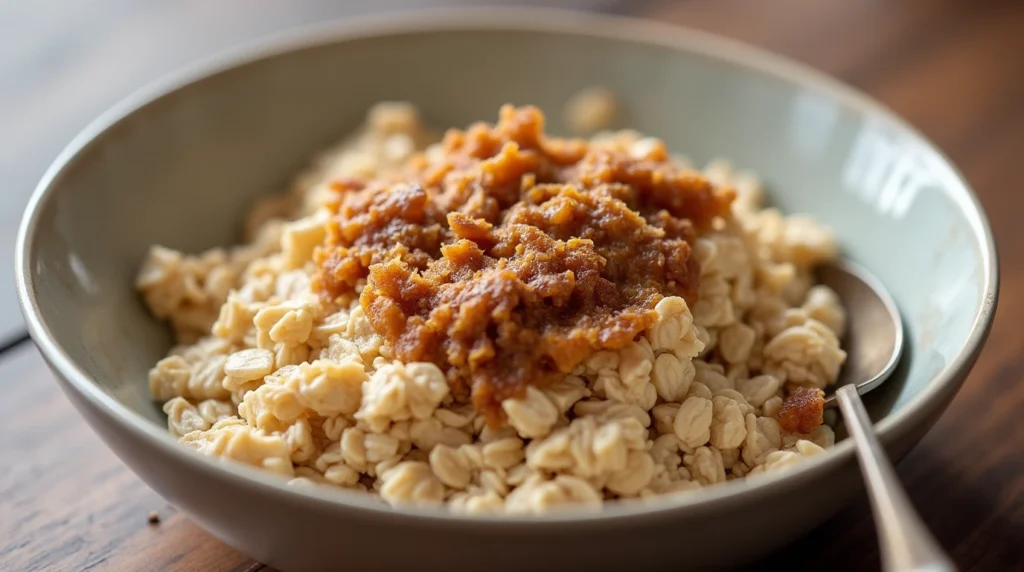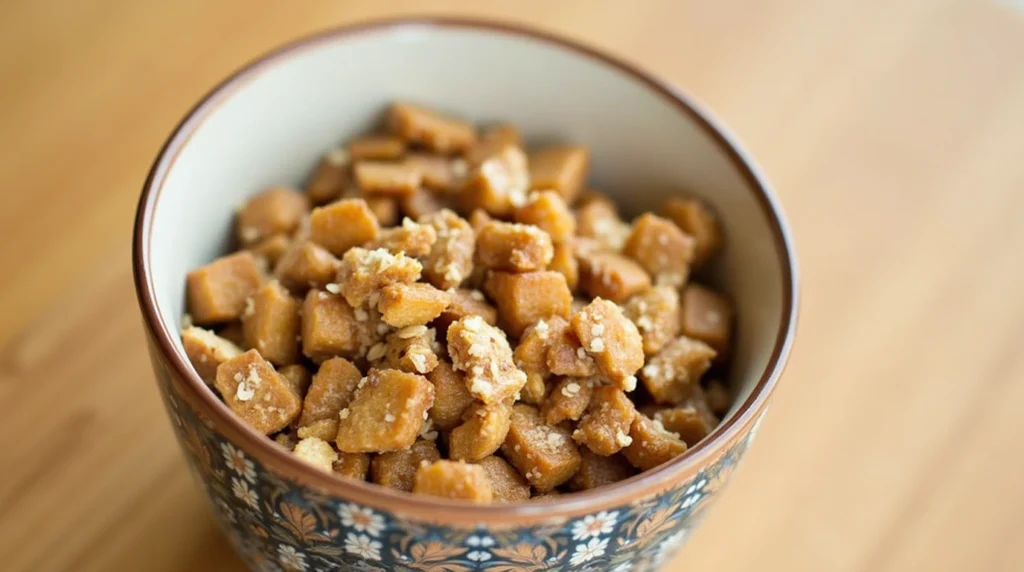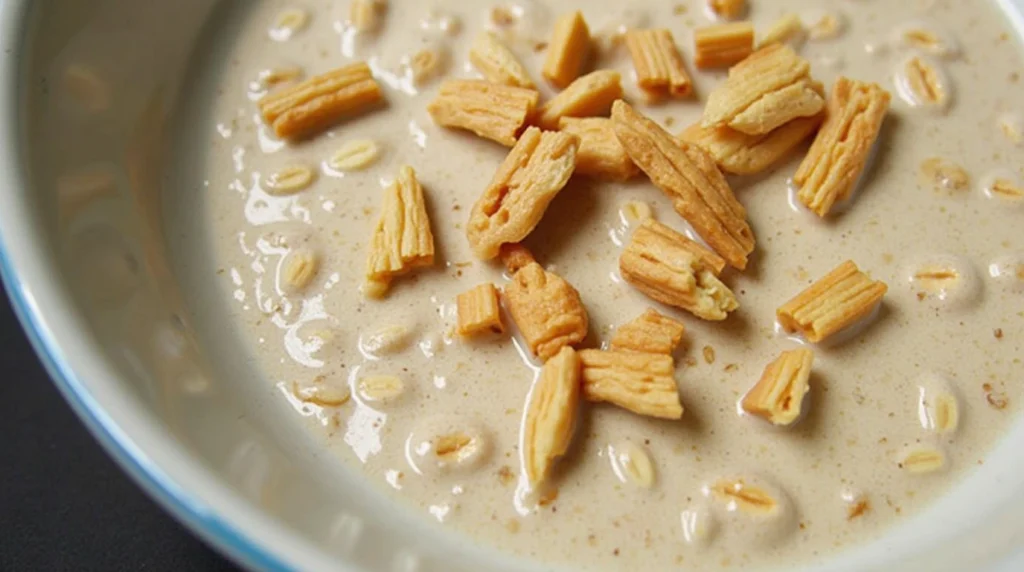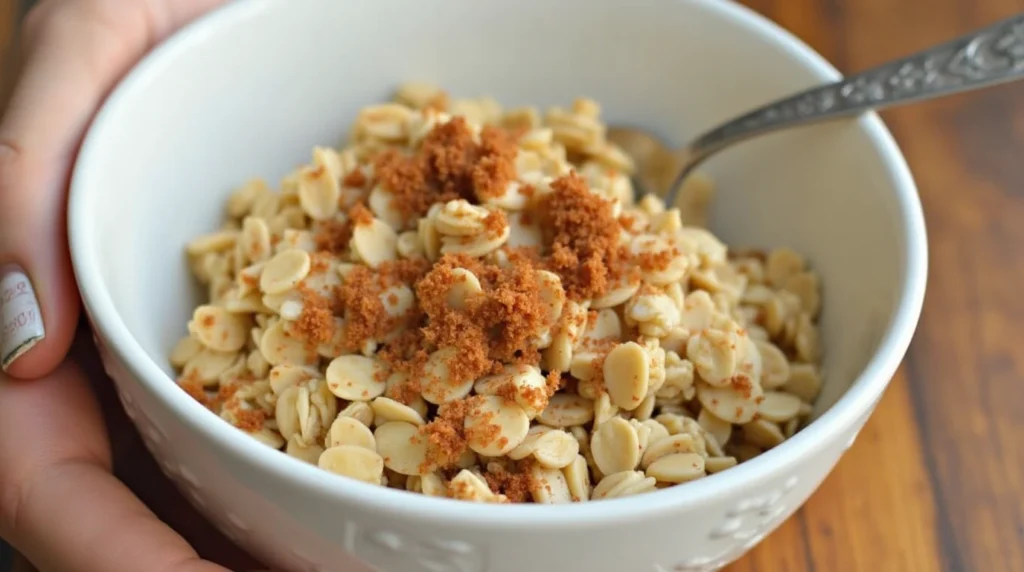Introduction

Have you ever wondered whether eating oatmeal every day is truly beneficial or if it’s just another health fad? Whether you’re looking for a nutritious breakfast option or are simply curious about oatmeal’s impact on your well-being, you’re not alone in asking. Oatmeal has become one of the most popular breakfast choices, but many still wonder: Is it okay to eat oatmeal daily? In this article, we’ll explore the powerful health benefits of oatmeal, how it impacts various aspects of your health, and whether eating it every day is right for you. By the end, you’ll have a clear understanding of why oatmeal should be a regular part of your diet and how to enjoy it to its fullest potential.
The Nutritional Benefits of Eating Oatmeal Daily
Oatmeal is not only delicious but also packed with essential nutrients that support your overall health. Eating oatmeal daily provides a variety of nutritional benefits that can improve your digestive system, heart health, and more.
High Fiber Content
- Digestive Health: Oats are rich in fiber, especially beta-glucan, a type of soluble fiber. This fiber helps regulate your digestion by promoting regular bowel movements and preventing constipation.
- Heart Health: The soluble fiber in oatmeal has been shown to reduce levels of LDL cholesterol (the “bad” cholesterol), promoting a healthier heart and reducing the risk of cardiovascular diseases.
- Blood Sugar Control: Beta-glucan also helps stabilize blood sugar levels by slowing the absorption of glucose into the bloodstream, which is particularly beneficial for those managing diabetes.
Rich in Protein
- Plant-Based Protein: Oatmeal is a great source of plant-based protein, which is essential for muscle growth, tissue repair, and overall body function. Including oatmeal in your daily diet can support your body’s protein needs, especially for those following a vegetarian or vegan lifestyle.
- Helps with Satiety: Protein-rich foods like oatmeal help you feel fuller for longer, reducing the likelihood of overeating later in the day.
Packed with Vitamins and Minerals
- Vitamins and Minerals: Oats are a powerhouse of essential nutrients, including iron, magnesium, phosphorus, and several B-vitamins. These nutrients support your energy levels, bone health, and immune system, making oatmeal an excellent addition to your daily diet.
- Antioxidants: Oats also contain antioxidants such as avenanthramides, which help protect your cells from oxidative stress and reduce inflammation in the body.
Oatmeal and Heart Health
The health benefits of oatmeal extend far beyond digestion. Oatmeal is a heart-healthy food that can significantly impact your cardiovascular well-being.
Lowering Cholesterol Levels
- Cholesterol Reduction: Studies have shown that consuming oatmeal regularly can lower LDL cholesterol due to its high beta-glucan content. By reducing cholesterol levels, oatmeal supports better heart health and decreases the risk of heart disease.
- Impact on Total Cholesterol: A study published in the American Journal of Clinical Nutrition found that eating oatmeal every day could reduce total cholesterol levels by as much as 5-10%.
Improving Blood Pressure
- Blood Pressure Benefits: Oats are rich in potassium, a mineral that helps regulate blood pressure. By consuming oatmeal daily, you may reduce the risk of hypertension and improve overall heart function.
- Role of Fiber: The fiber in oatmeal also helps improve circulation and reduce the strain on your cardiovascular system, contributing to better blood pressure control.
Anti-inflammatory Properties
- Reducing Inflammation: Oats contain antioxidants like avenanthramides, which help to reduce inflammation in the body. This is particularly important for heart health, as chronic inflammation is a known risk factor for cardiovascular diseases.
Can Oatmeal Help with Weight Loss?
If you’re looking to shed some extra pounds, oatmeal might just be the perfect addition to your diet. Here’s why oatmeal is beneficial for weight management.
Appetite Control
- High Fiber Content: The fiber in oatmeal absorbs water and expands in your stomach, helping you feel fuller longer. This reduces the chances of snacking between meals and helps with portion control.
- Preventing Overeating: A hearty bowl of oatmeal in the morning can help curb your appetite throughout the day, making it easier to stick to your weight loss goals.
Low-Calorie Option
- Filling, Yet Low-Calorie: Despite being filling, oatmeal is relatively low in calories, making it a great option for those looking to control their calorie intake without sacrificing fullness.
- Customizable: You can easily customize your oatmeal with healthy toppings like fruits, seeds, and nuts to add flavor and nutritional value without adding excessive calories.
Healthy Eating Habits
- Balanced Diet: Oatmeal is rich in nutrients that can help you maintain a balanced diet while managing your weight. Combine it with other healthy foods like fruits, vegetables, and lean proteins for a well-rounded meal.
- Sustainable Weight Loss: Since oatmeal is high in fiber and protein, it helps you stay satisfied longer, reducing the likelihood of overeating and supporting long-term weight loss goals.

Oatmeal Variations: Instant, Steel-Cut, and Rolled Oats
Not all oats are created equal. Understanding the different types of oatmeal can help you choose the best option for your health goals and taste preferences.
Instant Oats vs. Traditional Oats
- Instant Oats: While convenient, instant oatmeal often contains added sugar and sodium, which can diminish its nutritional value. If you’re looking for a healthier option, it’s best to stick to traditional oats.
- Rolled Oats: Rolled oats are minimally processed, retaining most of the oat’s nutritional value. They cook faster than steel-cut oats but still provide a substantial amount of fiber and protein.
Steel-Cut Oats
- Lower Glycemic Index: Steel-cut oats are less processed than rolled oats, which means they have a lower glycemic index. This makes them a better option for controlling blood sugar levels.
- Higher Fiber Content: Steel-cut oats have a chewier texture and slightly higher fiber content compared to rolled oats, making them even more beneficial for digestion and heart health.
Creative Oatmeal Recipes
- Toppings and Add-ins: To keep your oatmeal interesting, try adding a variety of toppings such as fresh berries, nuts, seeds, and spices like cinnamon or nutmeg. These additions enhance the flavor and nutritional profile of your oatmeal.
- Oatmeal Variations: From overnight oats to baked oatmeal, there are countless ways to enjoy oats. Experiment with different combinations to find your favorite!
Possible Side Effects and Considerations of Eating Oatmeal Every Day
While oatmeal has numerous benefits, it’s important to be aware of potential side effects and consider whether daily consumption is right for you.
Potential for Overconsumption of Fiber
- Digestive Issues: Consuming too much fiber in a short period of time can lead to digestive discomfort, such as bloating, gas, or constipation. To avoid this, gradually increase your fiber intake and drink plenty of water.
Glycemic Index and Blood Sugar
- Blood Sugar Spikes: Although oatmeal is a healthy choice for most people, those with diabetes should monitor how their body reacts to the glycemic index of different types of oats. Steel-cut oats tend to have a lower glycemic index, making them a better choice for blood sugar control.
Balanced Diet is Key
- Variety Matters: While oatmeal is healthy, it’s important to maintain a balanced diet that includes a variety of whole grains, fruits, vegetables, and protein sources. Eating a wide range of nutrient-dense foods ensures you get all the vitamins and minerals your body needs.

Can Oatmeal Help with Weight Loss?
Introduction to Weight Loss Benefits
- Appetite Control: Oatmeal is known for its ability to help with appetite control. The fiber, particularly the beta-glucan, in oats slows down the digestion process, making you feel fuller for longer. This can significantly reduce the temptation to snack between meals or overeat at lunchtime.
- Key Point to Discuss: Explain how oatmeal’s fiber absorbs water and swells in your stomach, which can help control your appetite and prevent overeating. Studies support that fiber-rich meals can help reduce hunger and overall calorie intake.
- Supporting Data: Reference studies or data linking high-fiber foods to appetite suppression and weight loss, such as studies by the American Heart Association or nutrition experts.
- Low-Calorie Option: Despite being filling, oatmeal is low in calories. If you choose a healthier preparation, such as plain oats without too much sugar or heavy cream, oatmeal can be a satisfying meal that doesn’t contribute to calorie overload.
- Key Points to Include:
- Discuss how a basic bowl of oatmeal can range from 150 to 200 calories.
- Suggest using low-calorie toppings, such as fresh berries or a sprinkle of cinnamon.
- Contrast this with the calories found in typical sugary breakfast options, such as pastries or cereals.
- Key Points to Include:
- Healthy Eating Habits: Incorporating oatmeal into a balanced diet can assist in long-term weight management. By keeping your breakfast calorie-controlled and fiber-packed, oatmeal can help form part of a healthy lifestyle that emphasizes sustainable eating habits over fad diets.
- Suggestions for Weight Management:
- Discuss pairing oatmeal with a source of healthy fat or protein (like nuts or seeds) to further support satiety and balance blood sugar levels.
- Recommend consulting with a nutritionist to build a well-rounded daily diet.
- Suggestions for Weight Management:
Oatmeal Variations: Instant, Steel-Cut, and Rolled Oats
Comparing Different Types of Oats
- Instant Oats vs. Traditional Oats: Instant oatmeal is a popular, quick option, but it may not always offer the same nutritional benefits as steel-cut or rolled oats. Instant oats are often processed to cook faster, but this process can strip some of their nutrients and can add unnecessary sugars or sodium.
- Key Points to Include:
- Instant oatmeal often comes pre-flavored with sugars and preservatives, which can diminish its health benefits.
- Compare the glycemic index of instant oats with rolled oats and steel-cut oats. Instant oats generally have a higher glycemic index, leading to a quicker spike in blood sugar.
- Key Points to Include:
- Steel-Cut Oats: Steel-cut oats are made by chopping the oat groats into smaller pieces, which results in a chewier texture and a lower glycemic index. This means they digest slower and provide longer-lasting energy.
- Key Points to Include:
- Discuss the fiber content and how steel-cut oats help stabilize blood sugar levels.
- Mention the longer cooking time required for steel-cut oats but highlight the benefits of their nutritional profile.
- Key Points to Include:
- Rolled Oats: Rolled oats are steamed and flattened, making them quicker to cook than steel-cut oats but still offering a decent amount of fiber. They are also versatile and can be used in baking, smoothies, or overnight oats.
- Key Points to Include:
- Emphasize the balance between convenience and health in rolled oats.
- Suggest ways to use rolled oats in recipes beyond just breakfast, such as in cookies, granola, or as a thickener in soups.
- Key Points to Include:
Creative Oatmeal Recipes:
- Toppings and Variations: To keep things exciting and nutritionally diverse, you can top your oatmeal with various healthy toppings:
- Fresh fruits like blueberries, bananas, or apples.
- Nuts and seeds, such as almonds, chia seeds, or flaxseeds.
- Spices like cinnamon, nutmeg, or vanilla extract for added flavor without excess sugar.
- Nut butter, such as almond butter or peanut butter, for healthy fats and protein.
Possible Side Effects and Considerations of Eating Oatmeal Every Day
Potential for Overconsumption of Fiber
- Digestive Issues: While it is packed with fiber, it’s important not to overdo it. Consuming too much fiber in a short period can lead to digestive discomfort, including bloating, gas, and stomach cramps.
- Advice for Moderation: Emphasize the importance of gradually increasing fiber intake to allow your digestive system to adjust.
- Recommended Daily Fiber Intake: Mention that adults should aim for about 25-38 grams of fiber per day, and eating a large bowl of oatmeal may contribute significantly to this intake.
Glycemic Index and Blood Sugar Levels
- Considerations for Diabetics: For individuals with diabetes, it can affect blood sugar levels. Although oats have a lower glycemic index than many processed breakfast foods, it’s still important to monitor portion sizes.
- Suggestions:
- Choose steel-cut or rolled oats for a lower glycemic impact.
- Pair oatmeal with protein or healthy fats to mitigate blood sugar spikes.
- Encourage readers with diabetes to speak to their healthcare providers about their oatmeal consumption.
- Suggestions:
Balanced Diet is Key
- Variety and Nutrient Balance: While oatmeal is a healthy addition to your diet, it should be part of a balanced, varied eating plan. Eating it every day is fine, but it’s essential to include other nutrient-dense foods to ensure you’re getting a broad range of vitamins, minerals, and nutrients.
- Suggestions for Variety:
- Incorporate vegetables, lean proteins, and healthy fats into your daily meals.
- Avoid the temptation to rely solely on oatmeal as your primary food source.
- Suggestions for Variety:

Conclusion
Eating oatmeal daily can offer numerous health benefits, from improving heart health to supporting weight loss. However, as with any food, moderation is key. Be sure to vary your diet and incorporate different types of oats and toppings to keep things interesting. Whether you prefer steel-cut oats, rolled oats, or overnight oats, the possibilities are endless! Ready to make it a part of your daily routine? Let us know in the comments how you enjoy yours, and feel free to share your favorite recipes.
FAQ
1: Can I eat oatmeal every day?
- Yes, it is generally safe to eat it every day. In fact, its high fiber content and other nutritional benefits make it a great choice for daily consumption, as long as you balance it with other healthy foods.
2: What are the benefits of eating oatmeal daily?
- Daily consumption offers benefits such as improved heart health, better digestion, weight management, and a steady supply of essential vitamins and minerals.
3: Is oatmeal good for weight loss?
- Yes, it can help with weight loss due to its fiber content, which helps keep you full longer and reduces overeating. It is also low in calories, making it a healthy choice for those looking to manage their weight.
4: What type of oatmeal is healthiest?
- Steel-cut oats are the healthiest option due to their lower glycemic index and higher fiber content. Rolled oats are also a great choice, while instant oats should be consumed in moderation due to added sugars and preservatives.
5: Are there any side effects to eating oatmeal every day?
- For most people, eating it every day is perfectly fine. However, overconsuming fiber can lead to digestive discomfort, and those with diabetes should monitor blood sugar levels due to oatmeal’s glycemic index.
Tables for Recipes (e.g., Oatmeal Toppings):
| Topping | Nutritional Benefits |
|---|---|
| Berries (Strawberries, Blueberries) | Rich in antioxidants, vitamin C |
| Chia Seeds | High in omega-3 fatty acids, fiber |
| Almond Butter | Protein, healthy fats |
| Cinnamon | Anti-inflammatory, blood sugar regulation |
